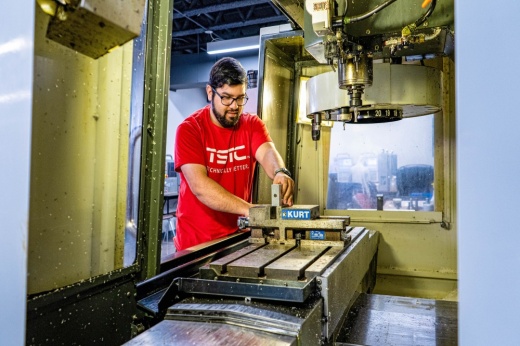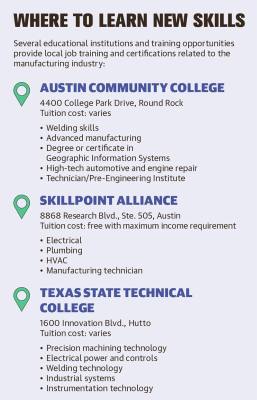As global semiconductor and other tech manufacturers, including Samsung, Applied Materials and Valex, continue to build large facilities in Central Texas, local economy experts project the influx of new industry-related jobs will grow by almost 30% within two years.
About 70,000 existing manufacturing jobs throughout Central Texas are expected to grow to 90,000 by 2024 as new operations come online, said Ed Latson, executive director of the Austin Regional Manufacturers Association during a Feb. 8 Pflugerville Community Development Corporation workforce panel.
Due in part to that rapid escalation, workforce development entities serving Round Rock, Pflugerville and Hutto are working to help meet coming staffing needs, Round Rock Chamber President Jordan Robinson said.
In addition to manufacturing, health care, social assistance and food service industry occupations are also experiencing increases in the number of jobs coming to the area.
Industry leaders predict that to meet the need, a combined effort to educate new workers as well as fundamental changes to the way these professions are taught and presented within the local education system must be executed in a timely fashion.
“There is an emerging cross section of economic development, workforce and education coming together in a real quick fashion,” said Amy Madison, the CEO of the Pflugerville Community Development Corp.

Emerging industry
Dave Porter, the director of the Williamson County Economic Development Partnership, said recent commitments from major manufacturers Samsung, Applied Materials and Valex, among others, to build facilities in the area are contributing to a regional shift in workforce training.
Samsung alone will bring more than 10,000 jobs to Williamson County at its new Taylor facility, according to the company.
Porter said these jobs, such as those required for semiconductor and electronic component, machinery and computer manufacturing, will help the region catch up to manufacturing needs on a national level.
Madison echoed Porter and said the increased interest in domestic manufacturing in the Pflugerville-Hutto area is largely due to the availability of land and its proximity to roadways such as SH 130 and SH 45 N.
“To have had so many large projects come all at once over a period of the past four years is really unheard of,” Madison said. “It puts Austin on the international scale easily in terms of manufacturing.”

Mismatched skills
The region has a growing problem of a skills gap in which workers have skills for jobs that do not exist or have reduced demand. Those include office clerks, customer service representatives and cashiers, according to data from the Texas Workforce Solutions Rural Capital Area, which includes Williamson County.
Workforce Solutions data shows several industries in the area have more qualified workers than job postings.
Beyond manufacturing, other industries are adding thousands more jobs in the next two years and are in need of more skilled labor. They include construction, educational services and information.
Reskilling and upskilling, the process of increasing a worker’s skill set to move up in their field or change industries entirely, is a vital part of meeting the manufacturing industry demand, Workforce Solutions Rural Capital Area CEO Paul Fletcher said.
Fletcher said the mismatch of skills resulted from a lag in the education system’s preparation of graduates for the workforce. He said those who find themselves in a career requiring more than a high school diploma but less than a college degree may benefit the most from upskilling or reskilling.
For adults who want to learn new trades or skills to seek a different job, there are several options available locally, such as Skillpoint Alliance. The nonprofit provides free job training and certifications for trades such as electrician; plumbing; advanced manufacturing; and heating, ventilation and air conditioning technician.
Skillpoint Alliance CEO Kevin Brackmeyer said the workforce development nonprofit has expanded the number of certifications to match what employers are looking for.
“We’re trying to mimic our programs to coincide with what is expected in the manufacturing industry,” Brackmeyer said.

Regional partnerships
In Hutto, Texas State Technical College is working directly with employers to guide existing and future courses offered as well as the use of new facilities. After receiving $208 million through Senate Bill 52 in 2021 to construct additional facilities, Lissa Adams, the provost of the Texas State Technical College East Williamson County Campus, said the college system is working to invest those dollars with manufacturing growth in mind.
Additionally, local trade professionals maintain it is important to better market positions to students as early as elementary school.
Leaders including Adams said the public school system is an important starting point to change the perception of manufacturing jobs.
Pursuing a trade can yield a higher-paying job out of the gate with certifications, Adams said. These careers require technical skills and include jobs such as production line machinery.
“We’re seeing just so many opportunities for people that are reskilling or getting a new trade,” Adams said. “[But we’re also seeing students] at 19 years old are making over $60,000 a year with just two years of training under their belt. It’s pretty phenomenal.”






